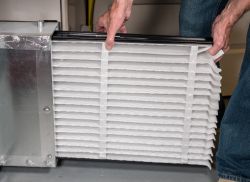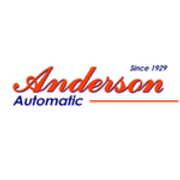3 Factors for Choosing the Right HVAC Air Filter

One of the most important parts of an HVAC system is its air filter. Filters are generally large disposable box-shaped sieves made of fibers or pleated material that clean the air that enters your home by capturing allergens and dust. As they become dirty over time, they begin to restrict airflow and cause your system to work harder to circulate throughout your home, lowering both air quality and energy efficiency. Disposable filters should be replaced at least once per season to prevent this, but it’s also essential to use the right type.
How to Select the Most Effective Air Filter
1. Determine the Right Size
Filters are measured in three sizes: length by width by depth. Check your manufacturer’s manual for the specific dimensions for your system or find them on the old filter. If you’ve been using the wrong size up until now, you can measure from the bottom of the air filter bay to its top, the depth of the filter’s slot, and from the back to the entrance of the compartment.
2. Choose the Right Material
HVAC filters come in different materials, including spun fiberglass, polyester, paper, or cotton folded into pleats, and electrostatic woven polypropylene media. High-efficiency particulate air (HEPA) filters are also a popular energy-efficient choice.
 Fiberglass filters promote maximum airflow but don’t significantly improve indoor air quality. Pleated models get less airflow but trap many common allergens, including pollen, pet dander, and dust mites. HEPA filters restrict airflow but offer superior filtration, while electrostatic versions offer good airflow and filtration and come in washable versions.
Fiberglass filters promote maximum airflow but don’t significantly improve indoor air quality. Pleated models get less airflow but trap many common allergens, including pollen, pet dander, and dust mites. HEPA filters restrict airflow but offer superior filtration, while electrostatic versions offer good airflow and filtration and come in washable versions.
Ultimately, you should choose the best material for you based on your household needs. For example, if you have pets and allergies, a pleated, HEPA, or electrostatic filter will be the best choice.
3. Check the MERV Rating
HVAC filters all have a minimum efficiency reporting value (MERV) rating that highlights how well they filter dust particles and allergens. A rating of 1 is the worst, while 16 is the highest.
MERV ratings of 16 might seem like the best option, but since they tend to slow down airflow more than lower numbers, it might not work with your HVAC system. Highly efficient filters must have compatible motors and fans to work with. For most homes and families, a rating of 9-12 is efficient.
If you need help determining which air filter is right for your heating and cooling system, the experts at Anderson Automatic Heating & Cooling in Cincinnati, OH, can help. Since 1929, this licensed and bonded HVAC contractor has helped homeowners and businesses stay comfortable and healthy indoors by providing maintenance and repairs on all makes and models of furnaces and air conditioners. To schedule an appointment, call (513) 574-0005 or visit them online to learn more about their maintenance and air quality services.
About the Business
Have a question? Ask the experts!
Send your question

